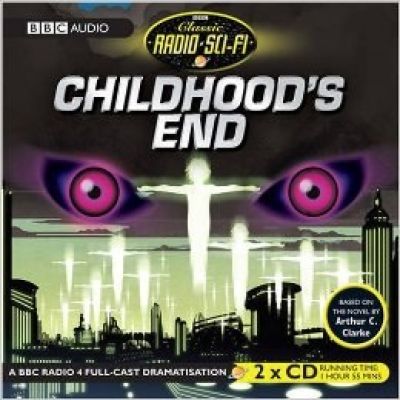My money is on “abomination”
Childhood’s End
By Arthur C. Clarke & Tony Mulholland

24 Oct, 2015
0 comments
Thisreview was inspired by the news that the Syfy network, perhaps bestknown for renaming itself after the Polish term for syphilis, hadacquired the rights to Arthur C. Clarke’s Childhood’sEnd .The jury is still out whether the Syfy version will be a full scaleabomination, like their adaptation of Earthsea,or merely wretched, like most of the rest of their product. Until thefull extent of the horror of this adaptation is revealed, I thoughtit would be fun to look at — sorry, listen to — a previous adaptationby a considerably more reputable organization with a long history ofpresenting SF works. I speak, of course, of the two-hour audioadaptation BBC 4 aired back in 1997.
Assoon as the radio play opens, it is clear that events have developednot necessarily to Earth’s advantage. The frame: a distressed JanRodericks reports to an entity named Karellen, narrating the ongoingdestruction of the Earth.
Afterthe frame has been established, the narrative shifts back somedecades to the coming of the alien Overlords. Their arrival coincideswith an international crisis of some seriousness. Although they arenot yet willing to reveal themselves to humans, the Overlords maketheir intentions known: they are here to assume control of the Earth.
Giventhe insurmountable technological lead the Overlords enjoy, there isnot much humanity can do to resist them. In very short order, humansociety is reshaped to suit the Overlords. The inevitable attempts toresist are put down very firmly, but without undue bloodshed.
Then,the Golden Age! Which, to be honest, appears to be monumentallyunsatisfactory from the point of view of humans trapped in anunforgiving world of relentless peace, prosperity, and freeexpression. While in the early days the Overlords were reluctant toallow freeholds outside their control, they relax their control overhumanity as the decades roll on; unfortunately, the pocket utopiasset up by various groups do not seem especially effective atproducing happiness or fulfillment either.
Thereis far more change to come, as the listener knows from the framingsequence. It might be that that the Overlords arrived during aninternational crisis, but that appears to be more coincidence thanintention. The real reason the Overlords are here is onlytangentially connected to our propensity for violence. The realreason has to do with our ultimate destiny. Which gets us back to theeventual sublimation/destruction of Earth.
~oOo~
Unsurprisingly,the cast have a range of accents that, while in no way limited tothose of the British educated classes, does sound like the result ofa London casting call. The play’s attempt at what may have beenintended as a Texan accent was bold but fundamentally misguided. Itwould probably have been better to ask the actor to mimic an accentthey could actually do convincingly. Of course, it could have beenworse. The British take on American accents was even less convincinga generation or two earlier.
Thisis a rather bloke-heavy cast list, but that’s to be expected. The original book featured many moremale characters than female characters. And of course, if themale/female balance in British anthologies and awards are anything to go by, it seems possible that only one or two percentof the British population consists of women. Presumably this would beas true of actors as it is for the general population.
Ithas been a while since I read the original, so this comment may notapply to the novel, but … Karellen is remarkably unconvincing whenhe outlines the Overlord plan for humanity. Some of this may be dueto the fact that he is an alien (d’oh!). He does not know how tolie skilfully, like a human politician, or how to avoid contradictinghimself; he and the other Overlords may not know Terran languages allthat well (at least in the beginning). Some early scenes, featuringKarellen chatting with the Secretary General, sound as if someonewere strangling a squid in the background. My guess is that the oddbackground noise is Overlordian; either Karellen is using machinetranslation or someone is by his elbow, giving him suggestions. Notthat felicity in translation really matters, since humans cannotpossibly resist the Overlords. Still, I do wonder if the Overloadtakeover was a last-minute decision, which allowed little time formeticulous preparation 1.
Thereare two possible interpretations of this book’s version of theeventual fate of humanity. Optimistic readers may believe that theOverlords are telling the truth about humans experiencing the nextstep in evolution. Realists point out that the alleged next step is orthogenesist nonsense. If that is the case then the Overlords, who have seenevolution at work on billions of worlds, are lying to humanity. I am firmly in the realist camp.
Iwasn’t particularly surprised that Tony Mulholland’s script alteredthe momentous events ongoing when the Overlords arrive (aSoviet/American space race dropped in favour of a more 1997-plausiblepolitical crisis; the collapse of the Soviet Union rendered theearlier plot point obsolete). I was surprised by his decision to use Jan Roderick’s narration as theframing sequence. The novel doesn’t immediately reveal that humansare screwed (I’m in the realist camp, you will recall), whereas theradio play makes that obvious from the beginning. It is a verydramatic difference between the two versions of the story.
The1997 radio play is a perfectly acceptable adaptation; it takes someliberties with the original, but I can see why those particularchanges were made. It didn’t blow my mind the way the original bookdid. But when I heard the play, I was older and less easily awed.
TheBBC adaptation can be acquired here.
1:My reasoning is thus:
A:The great transformation occurs about 130 years after the Overlord’sarrival.
B:The Overlords’ nearest base is some 40 light years away. TheOverlords have starships that can travel at close to light speed,which means that the time it took the first mission to just reach uswas close to a quarter of the time the Overlords spent overseeing thehuman transition. There’s very little leeway for scheduling error. Tome, that lack of leeway suggests a rush job, that the Overlordsweren’t aware of us until shortly before they dispatched that firstmission.
